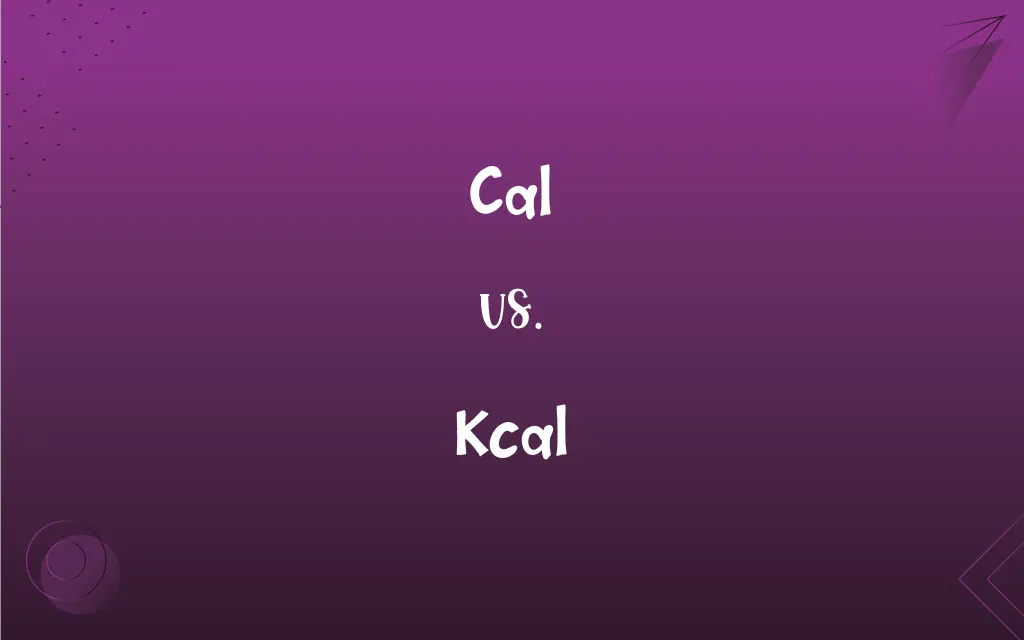Cal vs. Kcal: What's the Difference?
Edited by Janet White || By Harlon Moss || Updated on June 4, 2024
A cal (calorie) is a unit of energy, and a kcal (kilocalorie) is equal to 1000 calories. Often, kcal is used in nutritional contexts, while cal is used in scientific contexts.

Key Differences
Cal and kcal both represent units of energy, albeit in different magnitudes. The cal is the basic unit of energy in the International System of Units, while kcal, on the other hand, is a larger unit.
Cal is used in scientific contexts more often than kcal. In most scientific experiments and calculations, the cal is utilized. The kcal is more popular in food labeling and dietary contexts.
Cal is often seen as a smaller unit when compared to kcal. The conversion factor between the two units is 1 kcal = 1000 cal, illustrating that a kcal embodies more energy than a cal.
Cal and kcal, while both pertinent in discussing energy, find themselves being applied in different contexts. The cal may be used in smaller-scale energy measurements in physics and chemistry, while kcal predominantly appears in nutritional contexts.
Cal and kcal are both important units in their respective realms. The cal might be utilized in precise scientific contexts, while the kcal may be more pertinent for general public use, especially in relation to food energy.
ADVERTISEMENT
Comparison Chart
Definition
1/1000th of a kilocalorie
1,000 calories
Usage Context
Scientific measurements
Nutrition and dietary contexts
Energy Measurement
Energy to raise 1g of water by 1°C
Energy in food and physical activity
Common Use
Chemistry, physics
Food labels, diet planning
Scale
Small unit
Larger, practical unit for daily use
ADVERTISEMENT
Cal and Kcal Definitions
Cal
A cal is a unit of energy.
The reaction released 50 cal of energy.
Kcal
Kcal stands for kilocalories.
I consumed 2500 kcal today.
Cal
The cal is often used in physics and chemistry.
The scientist measured 10 cal in the experiment.
Kcal
The kcal is widely used in nutritional information.
This label says the drink contains 200 kcal.
Cal
Cal is seldom used in everyday language.
I rarely use the term cal when discussing my diet.
Kcal
Kcal is also referred to as a dietary calorie in the U.S.
The diet recommends limiting intake to 2000 kcal daily.
Cal
"Cal" is derived from the Latin word "calor," meaning heat.
The term cal is short for calorimeter in some contexts.
Kcal
Kcal measures the energy provided by food and drink.
My breakfast was 500 kcal.
Cal
Cal can refer to the quality of warmth and heat.
The cal of the sunlight was gentle.
Kcal
A kcal equals 1000 calories.
The apple has approximately 95 kcal.
Cal
Wolfram, an ore of tungsten.
Kcal
Abbreviation of kilocalorie
FAQs
Is cal used in food labeling?
Rarely, as kcal is predominantly used in food labeling to indicate energy.
Why is kcal used in nutrition instead of cal?
Kcal is used in nutrition to provide a more manageable and practical measure of energy from food, as using cal would involve large numbers.
How are kcal and cal related?
They are related in that 1 kcal equals 1000 cal.
What does kcal stand for?
Kcal stands for kilocalorie, equivalent to 1000 calories.
Can I convert cal to kcal easily?
Yes, you divide the number of cal by 1000 to get kcal.
How can I convert cal to kcal and kcal to cal?
Divide cal by 1000 to get kcal and multiply kcal by 1000 to get cal.
What does cal stand for?
Cal stands for calorie, a unit of energy.
Is there a difference between a dietary calorie and a kcal?
No, a dietary calorie and a kcal are equivalent and used interchangeably in the United States.
Is it possible to use cal in nutritional contexts?
Yes, it's possible, but it's impractical due to the large numbers; therefore, kcal is preferred for ease of understanding and simplicity.
How are cal and kcal used in diet tracking?
Kcal is typically used in diet tracking to help people manage their energy intake in a more straightforward manner.
What is the relationship between cal and kcal in energy expenditure?
Both can be used to describe energy expenditure, but kcal is commonly used for human energy expenditure due to its larger magnitude.
What role does kcal play in daily life?
Kcal is crucial in understanding and measuring the energy obtained from food and drink in our daily diet.
Why does the food label say "Calories" but mean kcal?
In the U.S., the term "Calories" with a capital C is used on food labels and it indeed means kcal.
Why might scientists prefer cal in experimental settings?
Scientists may prefer cal for smaller, more precise energy measurements in experiments due to its smaller magnitude compared to kcal.
Is a calorie from fat different than a calorie from carbohydrates in terms of kcal and cal?
No, a calorie is a consistent unit of energy; its source (fat, carbohydrate, protein) does not change its cal or kcal value.
How is the cal used in scientific contexts?
In scientific contexts, cal is used to measure amounts of heat energy, especially in chemistry and physics.
Are kcal and cal directly convertible?
Yes, 1 kcal is equal to 1000 cal, and vice versa.
Why do some countries prefer cal over kcal or vice versa?
The preference is often due to traditional practices and what is deemed to be more comprehensible to the general populace.
Are cal and kcal universally understood and used?
While they are widely understood, their use might differ, with some countries preferring kcal for food energy and others using cal.
Can I use kcal and cal interchangeably?
Technically, yes, but always ensure that the conversion is accurate (1 kcal = 1000 cal).
About Author
Written by
Harlon MossHarlon is a seasoned quality moderator and accomplished content writer for Difference Wiki. An alumnus of the prestigious University of California, he earned his degree in Computer Science. Leveraging his academic background, Harlon brings a meticulous and informed perspective to his work, ensuring content accuracy and excellence.
Edited by
Janet WhiteJanet White has been an esteemed writer and blogger for Difference Wiki. Holding a Master's degree in Science and Medical Journalism from the prestigious Boston University, she has consistently demonstrated her expertise and passion for her field. When she's not immersed in her work, Janet relishes her time exercising, delving into a good book, and cherishing moments with friends and family.































































